Fairmont Hotels and Resorts has produced a recipe book of sustainable dishes that have been created by its team of global chefs. Jenny Southan reports
In an affort to showcase the efforts each of its member hotels is making to become more sustainable, Fairmont has published an e-book titled Sustainable Kitchen, Earth-Friendly Recipes.
Devised by dozens of Fairmont chefs from London to San Francisco, Singapore to Egypt, the idea is to encourage more “Earth-friendly habits in the kitchen”. (In some cases this applies more to large-scale hotel kitchens than home kitchens – for example, we’d never have “cake trimmings” lying around at home.)
From summer English pea soup to Parker House rolls with whipped honey butter, there are 38 recipes in total spanning drinks, soups, entrées and desserts. In many cases they seek to show how to minimise food waste (vegetable peelings can be turned into stock, for example) and use local produce.Fairmont says its kitchens are “essential to delivering the brand’s commitments toward reducing energy and water use, waste and carbon emissions”.
The culinary teams are all working to forge close connections with farmers, fisheries and producers in each community they are based in, while planting their own vegetable gardens and fruit trees, and keeping beehives.
I attended the launch of the recipe book at a dinner at the Savoy, A Fairmont Managed Hotel, in London, where I was able to try some of the dishes cooked by chef Gerald Quadros and Simona Spennati from the Savoy, as well as Derek Kelly from Carlton House in Ireland, and Mark Brega from the Fairmont Windsor Park in England.
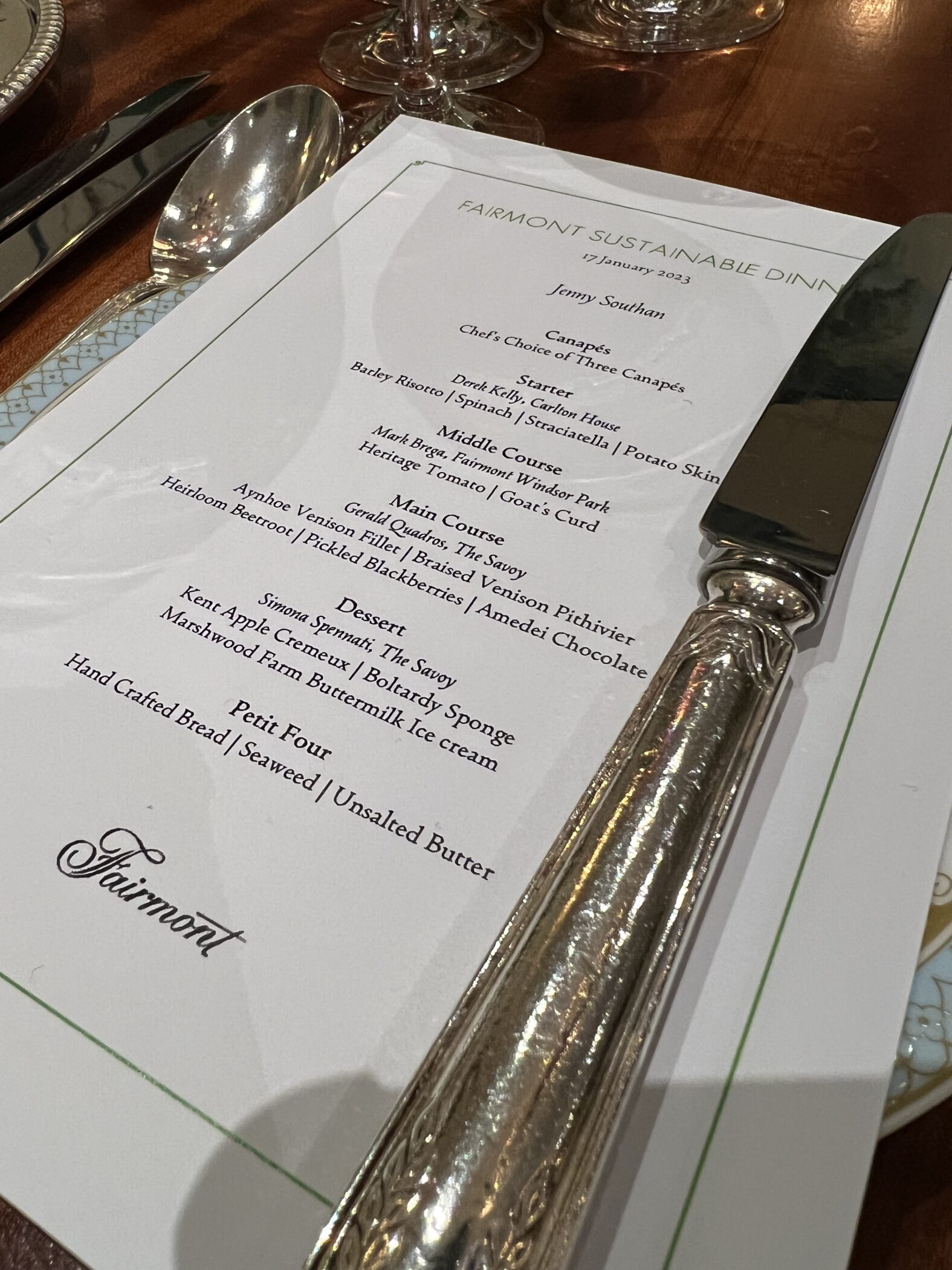 My first thought was that there was no way we could replicate any of the dishes served to us that evening, but on closer examination of the recipe book I thought that I might manage some of them. (I definitely want to have a go at the Harvest Bowl with Ginger and Sesame Dressing.)
My first thought was that there was no way we could replicate any of the dishes served to us that evening, but on closer examination of the recipe book I thought that I might manage some of them. (I definitely want to have a go at the Harvest Bowl with Ginger and Sesame Dressing.)

I particularly enjoyed eating the Toasted Barley, Wild Nettle and Ashed St Tola’s Goat Cheese Potato Skins – which was essentially a deep green barley risotto topped with fried potato skins and cheese.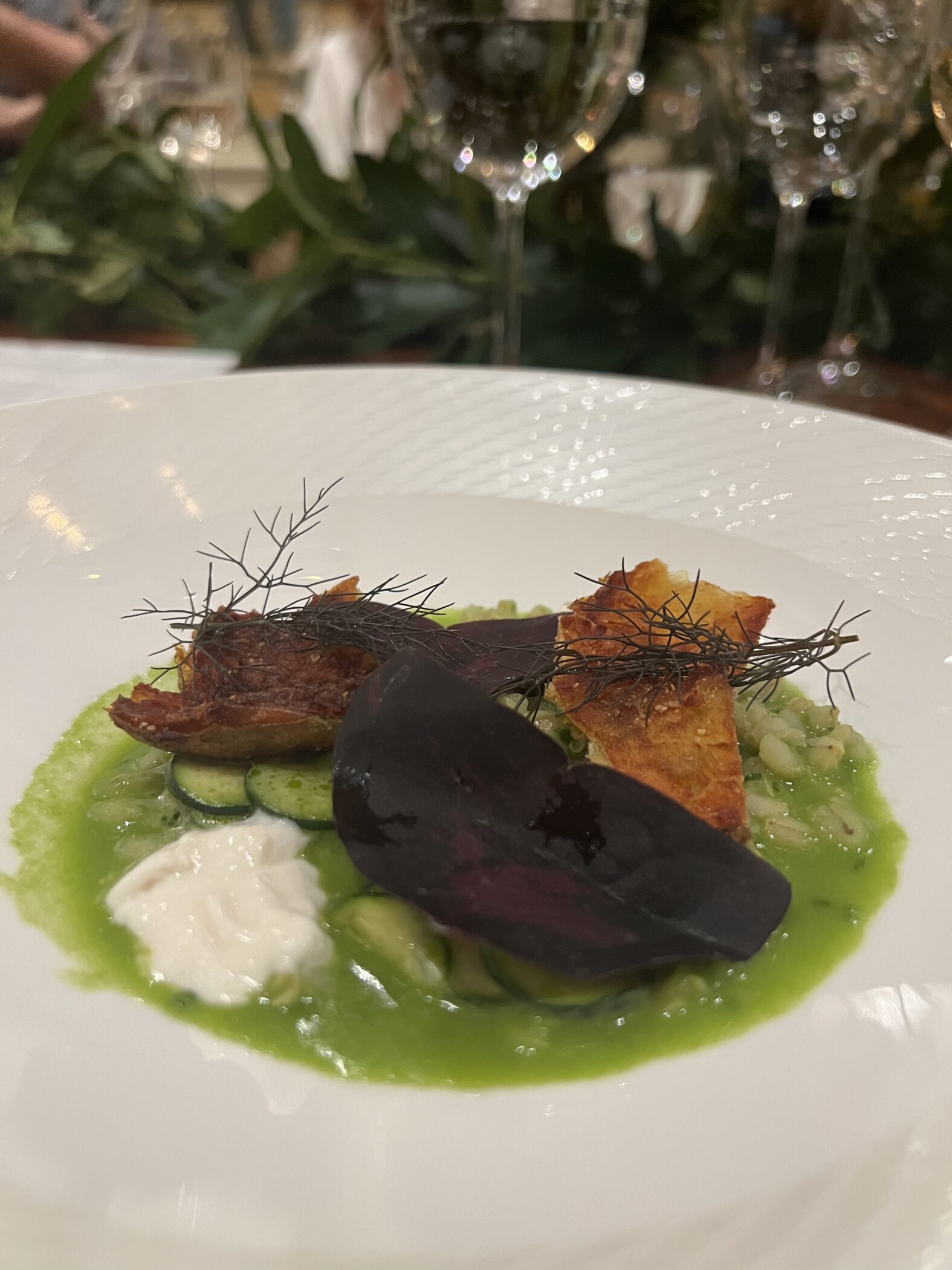 Looking at the recipe, though, I didn’t see what I was to do with the left-over potato that you scoop out after baking (presumably they use that for something else in the hotel kitchen).
Looking at the recipe, though, I didn’t see what I was to do with the left-over potato that you scoop out after baking (presumably they use that for something else in the hotel kitchen).
I also loved the Heritage Tomato, Goat’s Curd (from Wiltshire), Basil Oil and Pickled Shallot salad – all doused in Tomato Essence made from a consommé using tomatoes that are marinated, blitzed and strained. What’s leftover from is turned into a ketchup.
This was followed by a Vegetable Wellington (for the vegetarians) that was made with perfect golden pastry.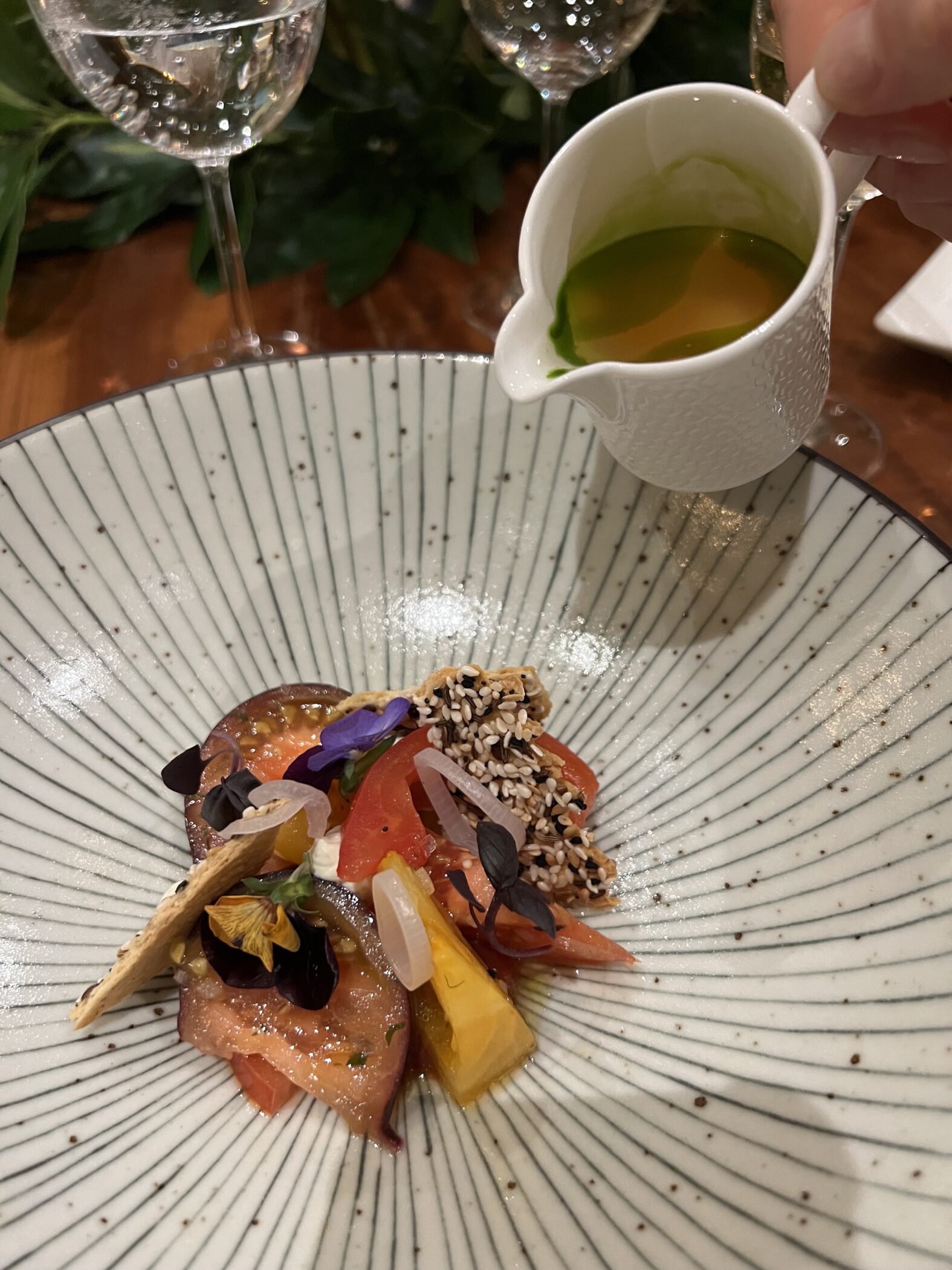
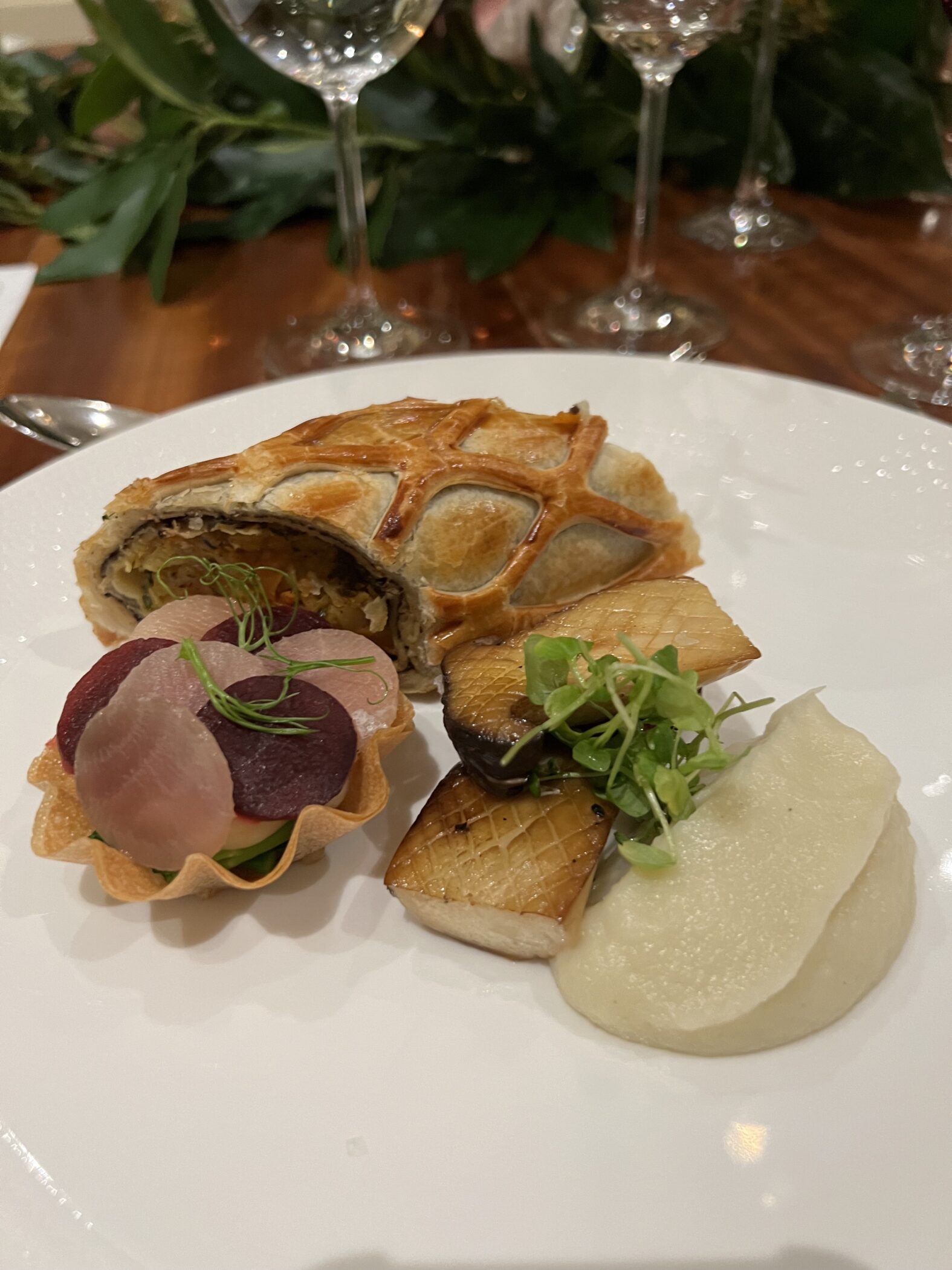 For the meat-eaters at the table, there was Venison Fillet with Braised Venison Pithivier, Winter Root Vegetables and Amedei Chocolate Sauce. Chef Quadros says that the ingredients are all seasonal and the venison is sourced from deer that has been ethically raised on Aynhoe Park Farm outside of London.
For the meat-eaters at the table, there was Venison Fillet with Braised Venison Pithivier, Winter Root Vegetables and Amedei Chocolate Sauce. Chef Quadros says that the ingredients are all seasonal and the venison is sourced from deer that has been ethically raised on Aynhoe Park Farm outside of London.
The dessert by Chef Spennati used local apples from Kent and buttermilk from Marshwood Farm. The “Compost Coffee Cake” featured in the recipe book was not served at our dinner. Although it doesn’t sound nice, I am sure it is very tasty and it’s certainly innovative.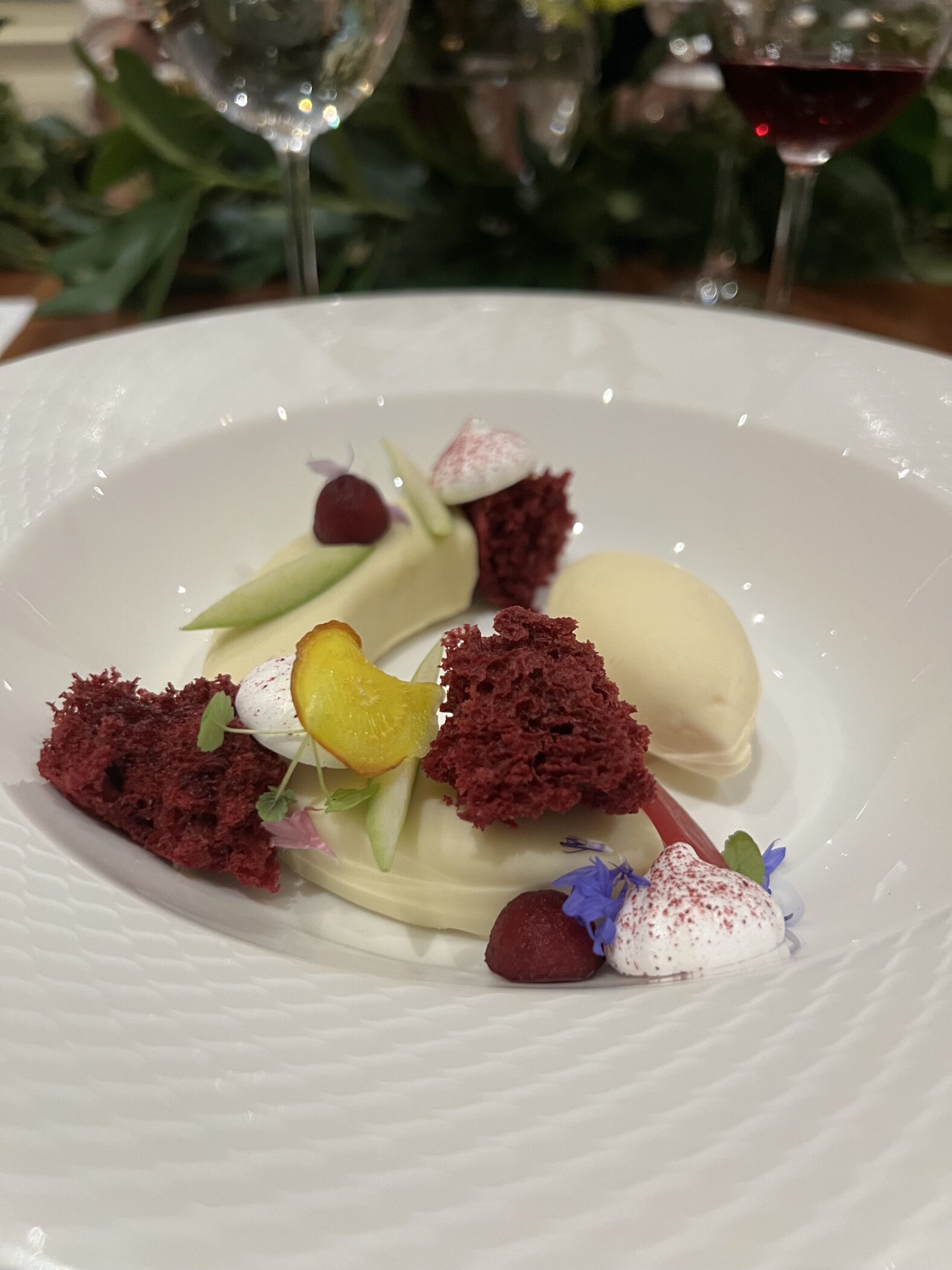 Overall I was really impressed with the efforts Fairmont is making to serve more sustainable cuisine, although I’d personally like to see less meat, fish and seafood on the menu.
Overall I was really impressed with the efforts Fairmont is making to serve more sustainable cuisine, although I’d personally like to see less meat, fish and seafood on the menu.
The Savoy itself has some interesting eco-credentials. In 2021 it was the first hotel in Europe to partner with Ecospirits, a revolutionary closed loop system that reduces the carbon footprint associated with the packaging and transport of spirits from distillery to bar by up to 80 per cent.
It is also attached to an Asian reforestation programme that sees one tree planted for every Ecospirits cocktail sold at the American Bar and Beaufort Bar (3,400 trees have been planted so far).
The Savoy was also the first five-star hotel in London to set up a scheme to convert food waste into renewable energy. By recycling 100 per cent of food waste into nutrient-rich bio fertiliser and renewable energy, through CHP and Anaerobic Digestion combination processes partnership ReFood UK, on average the hotel produces 55 Megawatts hours of electricity, saving 98 tonnes of CO2 per year. The Savoy’s additional electricity is supplied from 100 per cent renewable hydro, solar PV and wind power.
Fairmont says: “With a wide range of reduction and reuse initiatives, the food waste programme has gone from strength to strength.”
The hotel has also eliminated all guest-facing single-use plastics. In rooms it has replaced small toiletry bottles with large format dispensers from our partners Penhaligon’s and all “dry” room amenities such as shower caps, combs and toothbrushes are from sustainable sources.
